Gas Safety Bulletin - 33rd Issue (February 2022)
 Contents
Contents
Message from the Editor
01. Features
-
Gas Safety Improvement Measures for Village Houses
-
Newly Launched "eCheckDate" Facilitating Checking on the Expiry Date of LPG vehicle fuel tank for Revalidation
-
Restaurant Gas Safety Survey and Gas Installations "Quick Check"
02. Case Sharing
03. Legal Knowledge
-
On-Time Submission of Inspection Record of Notifiable Gas Installation
-
Cases of Violation of the Gas Safety Ordinance by Registered Gas Installers and Registered Gas Contractors Convicted by the Court
04. Did you know
-
New Gas Installer Registration Card and Voluntary Continuing Professional Development Scheme for Registered Gas Installers
-
Safe Use of Outdoor Camping Gas Appliances and Cylinders
05. Statistics
Message from the Editor
 Hello, everyone! In this issue of the Gas Safety Bulletin, we will talk about gas safety improvement measures for village houses, the newly launched "eCheckDate" service, Restaurant Gas Installations "Quick Check", notes on gas installation work, replacement of Gas Installer Registration Cards, voluntary continuing professional development schemes, and the safe use of outdoor camping gas appliances and cylinders. What’s more, legal knowledge and case sharing about gas safety, as well as gas-related incidents and prosecution statistics by type in January to December 2021 are included for reference.
Hello, everyone! In this issue of the Gas Safety Bulletin, we will talk about gas safety improvement measures for village houses, the newly launched "eCheckDate" service, Restaurant Gas Installations "Quick Check", notes on gas installation work, replacement of Gas Installer Registration Cards, voluntary continuing professional development schemes, and the safe use of outdoor camping gas appliances and cylinders. What’s more, legal knowledge and case sharing about gas safety, as well as gas-related incidents and prosecution statistics by type in January to December 2021 are included for reference.
Feature 1
Gas Safety Improvement Measures for Village Houses
 At present, many village house households in Hong Kong use LPG cylinders as fuel. In order to save indoor space, some households place LPG cylinders in outdoor locations near their village houses. This may obstruct pedestrian passages, and if households on various floors of a village house store a certain number of gas cylinders outdoors, it will even lead to the problem of accumulation of LPG cylinders and increase safety risks.
At present, many village house households in Hong Kong use LPG cylinders as fuel. In order to save indoor space, some households place LPG cylinders in outdoor locations near their village houses. This may obstruct pedestrian passages, and if households on various floors of a village house store a certain number of gas cylinders outdoors, it will even lead to the problem of accumulation of LPG cylinders and increase safety risks.
Regarding the storage issue of LPG cylinders in village houses, the EMSD and the LPG cylinder trade have recently discussed and reached a consensus for a series of improvement measures. The relevant operational safety guidelines have also been incorporated into the Code of Practice for LPG Cylinder Distributors (Seventh Edition) for the trade’s reference and compliance. The main measures include:
Measure (1):Promote the use of a common gas supply system that can be shared by households on various floors for replacement of the existing commonly used independent gas supply system for individual floors, and adoption of the shared common gas supply system in new village houses. |
Measure (2):Provide outdoor storage chambers for LPG cylinders.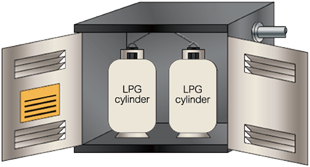 |
Measure (3):Distributors switch to use LPG cylinders of smaller capacity. |
Measure (4):Urge users not to store extra gas cylinders for spare use, and distributors should also replace used LPG cylinders for village house customers as soon as possible.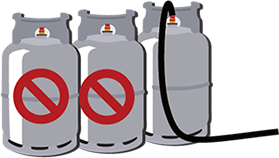 |
 Besides, the EMSD is promoting the measures to the public and stakeholders through various publicity channels, including distributing publicity leaflets to village households, placing advertisements on the bodies and seatbacks of minibuses and taxis, disseminating publicity messages via online media, and introducing the relevant measures to the trade at the Briefing Session for Registered Gas Contractors/Registered Gas Installers in December 2021, with a view to that the measures will be widely accepted, so that the storage condition of LPG cylinders in village houses will be improved in the long run.
Besides, the EMSD is promoting the measures to the public and stakeholders through various publicity channels, including distributing publicity leaflets to village households, placing advertisements on the bodies and seatbacks of minibuses and taxis, disseminating publicity messages via online media, and introducing the relevant measures to the trade at the Briefing Session for Registered Gas Contractors/Registered Gas Installers in December 2021, with a view to that the measures will be widely accepted, so that the storage condition of LPG cylinders in village houses will be improved in the long run.
Feature 2
Newly Launched "eCheckDate" Facilitating Checking on the Expiry Date of LPG Vehicle Fuel Tank for Revalidation
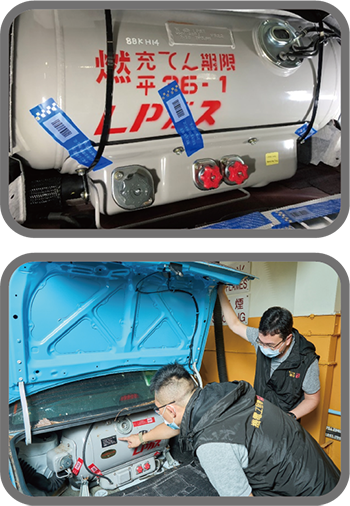 A new online "eCheckDate" (Easy Checking the Expiry Date of LPG Vehicle Fuel Tank for Revalidation) service launched by the Gas Standards Office has been officially opened for use by owners/agents of LPG vehicles since August 15 2021. Vehicle owners/agents can enter the vehicle registration number or the LPG vehicle fuel tank serial number into the new system to obtain such information as the expiry date of the LPG vehicle fuel tank for revalidation to facilitate the arrangement for the re-examination of the fuel tank as soon as possible before the expiry of the 5-year period.
A new online "eCheckDate" (Easy Checking the Expiry Date of LPG Vehicle Fuel Tank for Revalidation) service launched by the Gas Standards Office has been officially opened for use by owners/agents of LPG vehicles since August 15 2021. Vehicle owners/agents can enter the vehicle registration number or the LPG vehicle fuel tank serial number into the new system to obtain such information as the expiry date of the LPG vehicle fuel tank for revalidation to facilitate the arrangement for the re-examination of the fuel tank as soon as possible before the expiry of the 5-year period.
Under the Gas Safety (Gas Supply) Regulations, the owner of an LPG vehicle fuel tank shall not use the fuel tank to contain LPG unless it has been tested and examined at least once every 5 years to ascertain that the fuel tank is safe to be so used. The owner of the LPG vehicle fuel tank (i.e. the LPG vehicle owner) who contravenes the requirements of the ordinance commits an offence and is liable on conviction to a fine of $10,000 and, in the case of a continuing offence, to a daily penalty of $1,000.
As in the past, vehicle owners/agents can check on their own the latest inspection date marked on the LPG vehicle fuel tank. Now you may also directly check the LPG vehicle fuel tank expiry date for revalidation via the "eCheckDate" online service to arrange for re-examination of the fuel tank as soon as possible before the expiry of the 5-year period.
LPG vehicle fuel tank "eCheckDate" offers flexible and faster online checking service
- The interface is simple and easy to use with clear guidelines
- Search online and get the results immediately anytime and anywhere without the need to make a call
- Verify the LPG vehicle fuel tank serial number and the expiry date for revalidation by vehicle registration number and chassis number to ensure that the information is correct


For further information, please scan the QR code to log in "eCheckDate"Website.
If the Vehicle Registration No./LPG Vehicle Fuel Tank Serial No. you searched is out of the designated searching area, please contact Gas Standards Office of EMSD (Tel: 2808 3249 or 2808 3210).
Feature 3
Restaurant Gas Safety Survey and Gas Installations "Quick Check"
Often placed in hot and moist environments, gas installations in food premises with high usage are prone to corrosion. In view of previous incidents caused by aged gas appliances in Hong Kong, we are concerned about the safety hazards related to aged gas installations in food premises. The Gas Standards Office (GasSO) recommended that gas users of food premises should arrange regular safety inspection (RSI) once every 12 months. We also arranged gas safety inspectors to visit food premises in various districts to explain the importance of conducting timely RSI of gas installations in their premises and encourage them to make such arrangements as early as possible. In addition to stepping up gas safety inspections of restaurants and safety promotion work, we collaborated with the trade and introduced a new gas installation "Quick Check" scheme for the food premises that used LPG cylinders in 2019. We also collected a body of data through outreach visits and a questionnaire survey, and applied a risk-based approach to promote RSI at these premises in a more focused manner.
A professional survey contractor was commissioned to survey all food premises in Hong Kong in November 2019. The survey aimed to gauge gas utilisation at food premises and assess their gas safety situation based on the research findings, thereby identifying the targets that require priority attention.
The GasSO has completed the survey on gas utilisation of all food premises in Hong Kong in early 2021. The survey contractor collected gas utilisation data from over 15 000 licensed food premises and identified some of the food premises as priority targets. The respective registered gas supply companies of those establishments had followed up on those cases to offer "Quick Checks", and upgrade or replace the aged gas installations accordingly. Utilising limited resources to enhance the overall safety and reliability, "Quick Checks" allowed important gas installations and fittings to be inspected within a short period of time and were therefore widely accepted and adopted by the trade.
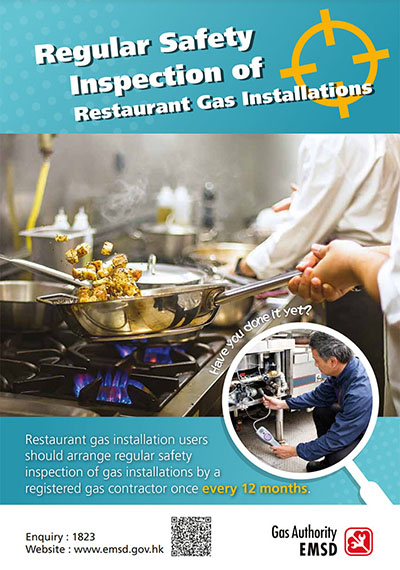 The database set up through the survey exercise has given us a comprehensive picture of gas utilisation situation at all licensed food premises and licensed clubhouses across the territory. The information collected, including the type of gas used, the serviceable life span of gas installations and the RSI status, has facilitated our ongoing work in promoting gas safety among food premises.
The database set up through the survey exercise has given us a comprehensive picture of gas utilisation situation at all licensed food premises and licensed clubhouses across the territory. The information collected, including the type of gas used, the serviceable life span of gas installations and the RSI status, has facilitated our ongoing work in promoting gas safety among food premises.
Statistics on major energy sources used for cooking in food premises
| Liquefied petroleum gas (LPG) in cylinders: | 4.0% |
|---|---|
| Centralised LPG: | 1.4% |
| Town gas: | 49.3% |
| Electricity: | 44.5% |
| Others: | 0.4% |
Case Study
Notes for Registered Gas Contractors on Gas Installation Work
Major maintenance projects in housing estates or buildings may involve gas installation work such as replacement of gas pipes on external walls of buildings. The relevant work includes fabrication, connection, disconnection, testing, commissioning, decommissioning, maintenance, repair, or replacement of gas fittings. According to the Gas Safety Ordinance, all gas installation work shall be carried out by registered gas contractors (RGCs) or registered gas installers (RGIs) with the appropriate registered grade employed by a RGC. RGCs shall supervise their employees in carrying out gas installation work to ensure that the work complies with the requirements of the Gas Safety Ordinance.
To ensure gas safety, RGCs shall take appropriate steps and measures in carrying out gas installation work and observe the following points:
- Every part of the gas pipe and fitting shall be of good construction and sound material and of adequate strength and size to convey the relevant gas safely under the operating pressure.
- Before conducting gas installation work or tests, hoarding shall be erected and notices be posted on the work in progress in the vicinity of the sites to prevent members of the public from entering the areas.
- Before commissioning the gas pipes, to ensure that they are structurally sound and gastight, procedures such as pressure test, pneumatic leak test and purging shall be conducted. Upon completion of work that might affect the gastightness of the gas supply system, e.g. replacement of service risers, test in relation to the gastightness of the system, covering at least as far as the nearest gas valves upstream and downstream, shall be conducted immediately.
- Clear marking shall be provided to indicate that the installed gas pipes and fittings are live gas installations.
- Before resumption of gas supply, the registered gas supply company shall be contacted for inspection of the gas supply network/system and the gas supply conditions of indoor gas users to ensure the operation of the buildings’gas supply system and the integrity and safety of individual gas pipes have not been affected.
- Records of the completed gas installation work, including the test reports, shall be maintained for at least two years.

Please note that RGCs and RGIs shall carry out the gas installation work in a proper and workmanlike manner. Any person who fails to comply with the requirements of the Gas Safety Ordinance is liable to a fine of $5,000 upon conviction.
Legal Knowledge 1
On-Time Submission of Inspection Record of Notifiable Gas Installation
 Section 6C of the Gas Safety (Gas Supply) Regulations (Cap. 51B) specifies that the owner of a notifiable gas installation (such as liquefied petroleum gas storage installation) shall ensure that the installation is inspected by a competent person at intervals not less than once every year to ascertain that the installation has been maintained and operated in accordance with regulation 6B. At the same time, the owner shall also keep a statutory inspection report of the installation and submit a copy of the report to the Gas Authority within 4 weeks after each inspection. Failure to timely submit a copy of the inspection report is an offense and liable on conviction to a fine of $5,000.
Section 6C of the Gas Safety (Gas Supply) Regulations (Cap. 51B) specifies that the owner of a notifiable gas installation (such as liquefied petroleum gas storage installation) shall ensure that the installation is inspected by a competent person at intervals not less than once every year to ascertain that the installation has been maintained and operated in accordance with regulation 6B. At the same time, the owner shall also keep a statutory inspection report of the installation and submit a copy of the report to the Gas Authority within 4 weeks after each inspection. Failure to timely submit a copy of the inspection report is an offense and liable on conviction to a fine of $5,000.
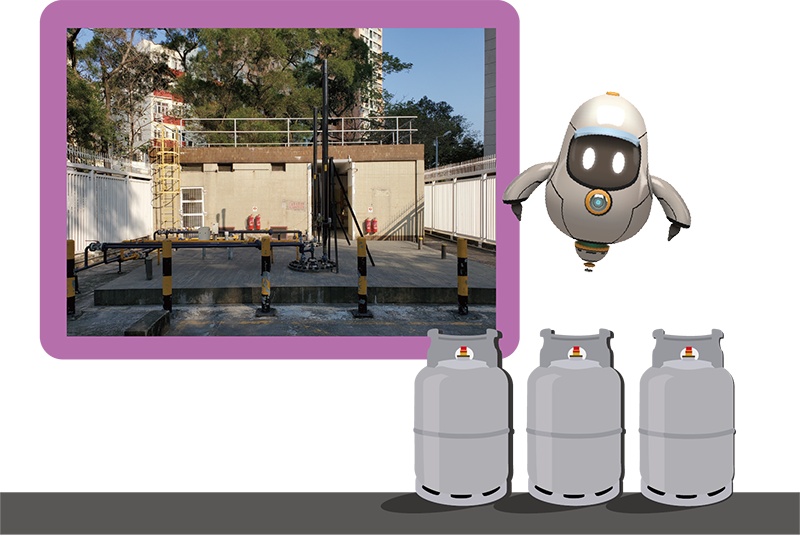
Legal Knowledge 2
Cases of Violation of the Gas Safety Ordinance by Registered Gas Installers and Registered Gas Contractors Convicted by the Court
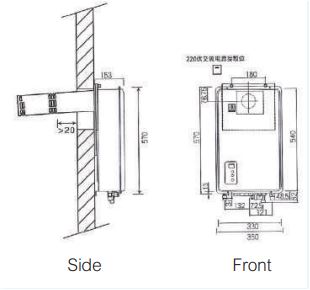 Installation of a domestic gas water heater without replacing the original exhaust flue
Installation of a domestic gas water heater without replacing the original exhaust flue
Case: The original exhaust flue was not replaced when a new gas water heater was installed for replacement.
Recommendation: Registered gas installers must follow the instructions of gas appliance manufacturers in conducting installation.
Court decisions and disciplinary actions:
- The registered gas installer was fined by the court for contravening the statutory requirements (Regulation 30(1)(c) of Cap. 51C).
- The registered gas contractor was held responsible for the offence committed by its employees (Section 30 of Cap. 51) and was fined by the court.
- The Gas Authority imposed disciplinary actions against the installer and the contractor.
Section 30(1)(c) of Cap. 51C:
Where a person installs a gas appliance at a time when gas is being supplied to any premises in which such appliance is installed, he should ascertain that such appliance has been installed with due regard to its manufacturer’s instructions, if any, accompanying such appliance./p>
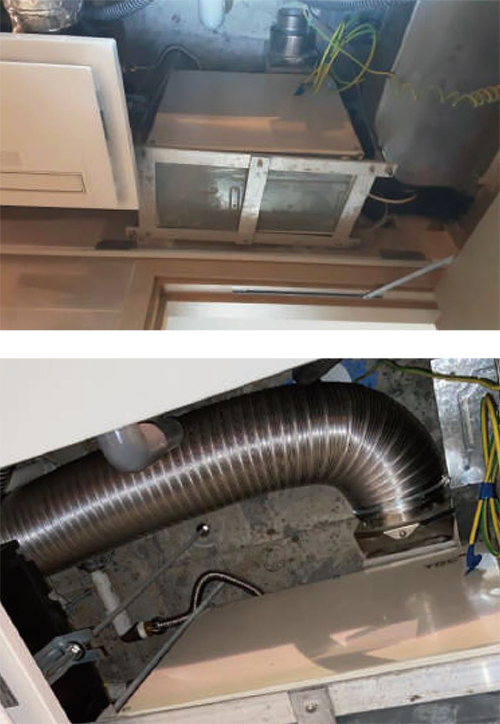 Supplying gas to a gas water heater with a missing flue
Supplying gas to a gas water heater with a missing flue
Case: Supplying gas to a unit when the gas water heater is not connected to the flue.
Recommendation:
- Before supplying gas, registered gas installers must follow the gas supply and testing guidelines of registered gas supply companies to carry out testing, examination and adjustments.
- Keep work records and photos.
Court decisions and disciplinary actions:
- The registered gas installer was fined by the court for contravening the statutory requirements (Regulation 30(3) of Cap. 51C).
- The registered gas contractor was held responsible for the offence committed by its employees (Section 30 of Cap. 51) and was fined by the court.
- The Gas Authority imposed disciplinary action against the installer and the contractor.
Section 30(3) of Cap. 51C:
No person shall supply gas to such appliance in a premise unless he has caused such testing and examination and adjustments as specified to be carried out.
Did You Know 1
New Gas Installer Registration Card
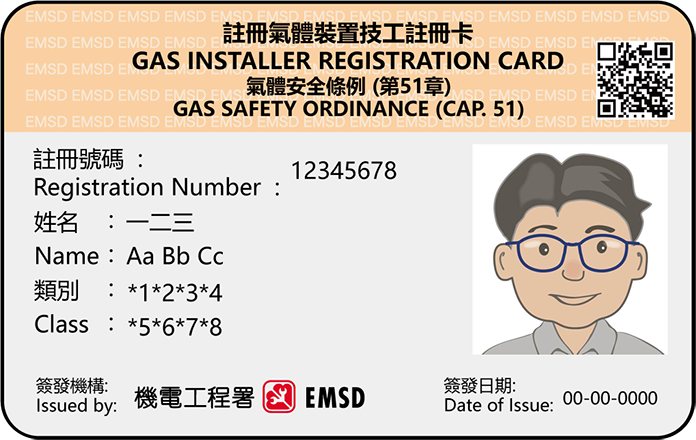 * The above design is for reference only.
* The above design is for reference only.
The Electrical and Mechanical Services Department plans to provide free replacement of installer cards for all registered gas installers in mid-2022. The new Gas Installer Registration Card is made of more durable materials.
Voluntary Continuing Professional Development Scheme for Registered Gas Installers
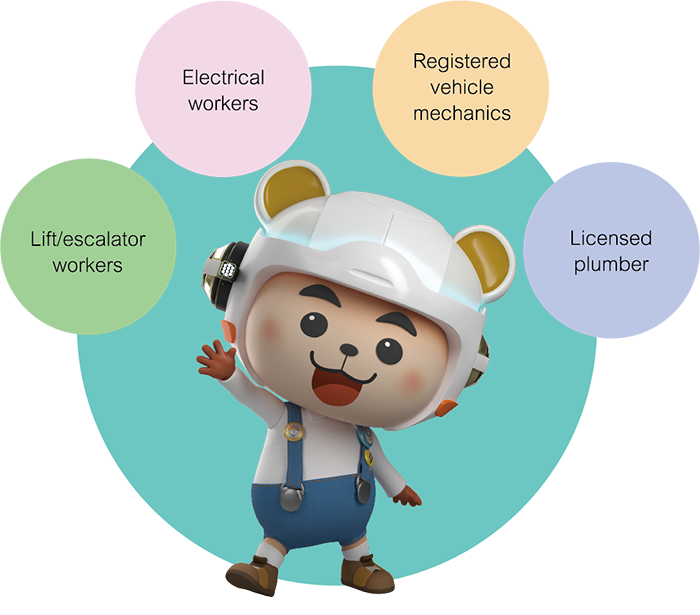
As continuing professional development schemes are available for other E&M trades, the Electrical and Mechanical Services Department also hopes to set up a voluntary continuing professional development scheme for registered gas installers.
If the trade has any comments on the EMSD's proposal mentioned above, please contact Mr. Chan on 2808 3228 or email to gasso@emsd.gov.hk.
Did You Know 2
Safe Use of Outdoor Camping Gas Appliances and Cylinders
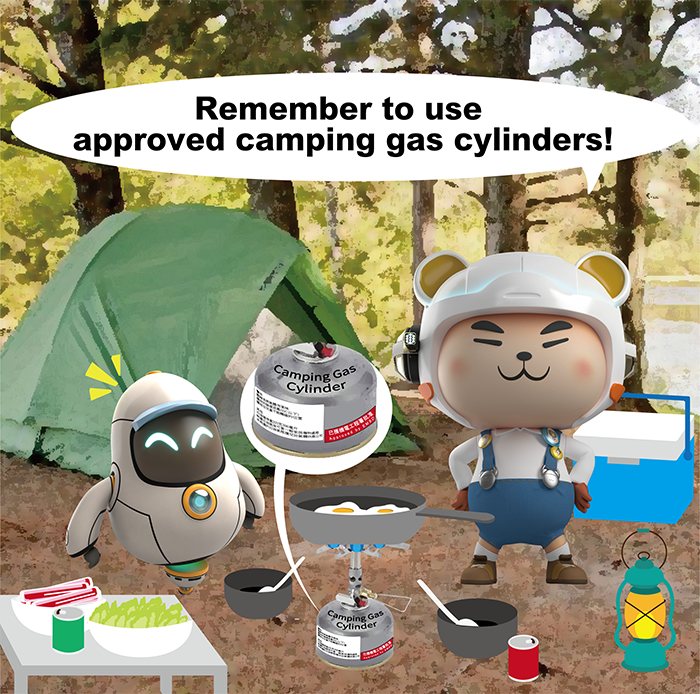 To ensure a safe and secure camping experience in the countryside, attention should be paid to the safe use of outdoor gas appliances and cylinders:
To ensure a safe and secure camping experience in the countryside, attention should be paid to the safe use of outdoor gas appliances and cylinders:
- Only purchase outdoor-specific gas appliances designed and manufactured in accordance with international/national recognised safety standards;
- Do not use outdoor-specific gas appliances indoors (or in tents);
- Do not use non-genuine accessories to connect camping gas appliances;
- Follow the safety and operating instructions stated in the manual of the gas appliances and those on the camping gas cylinders;
- Ensure that the gas appliance is turned off and the coupling is perfectly matched before connecting the appliance with the camping gas cylinder;
- After connecting the gas cylinder, make sure that there is no sign of gas leakage before turning on the camping gas appliance.
In case of LPG leakage, remember to immediately turn off the gas appliances and cut off the gas supply.
As approved camping gas cylinders are disposable LPG cylinders, do not refill them!
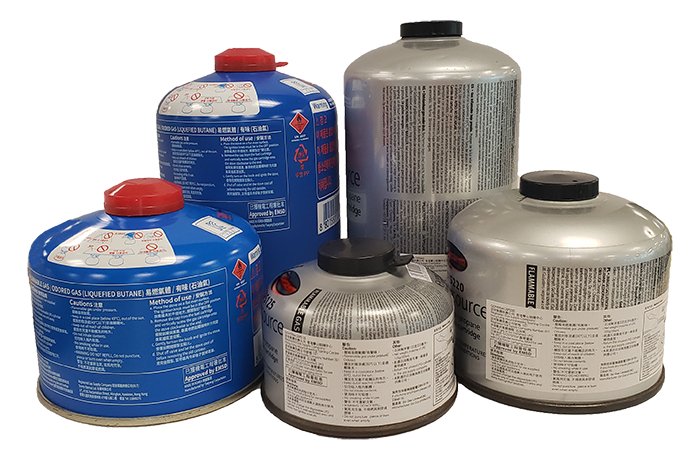

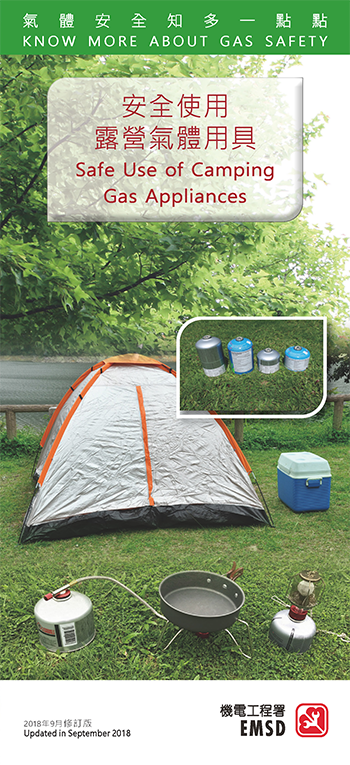
For more information regarding the safe use of camping gas appliances, please refer to our pamphlet "Safe Use of Camping Gas Appliances" by downloading from the website of the EMSD or scanning the QR code.
Statistics
Gas-related Incident and Prosecution Statistics by Type
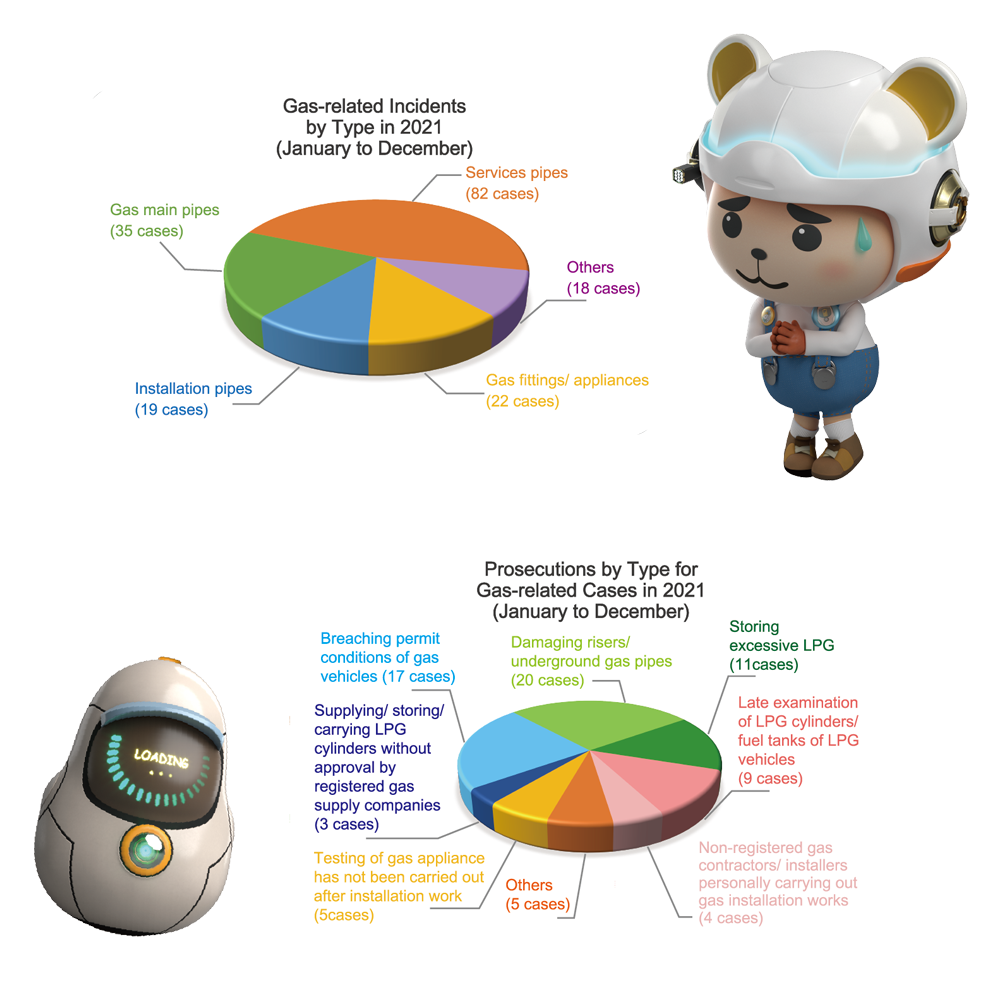
Gas-related Incidents by Type
in 2021 (January to December)
| Services pipes (82 cases) |
| Gas main pipes (35 cases) |
| Installation pipes (19 cases) |
| Gas fittings / appliances (22 cases) |
| Others (18 cases) |
Prosecutions by Type for Gas-related Cases
in 2021 (January to December)
| Testing of gas appliance has not been carried out after installation work (5 cases) |
| Supplying / storing / carrying LPG cylinders without approval by registered gas supply companies (3 cases) |
| Breaching permit conditions of gas vehicles (17 cases) |
| Damaging risers/underground gas pipes (20 cases) |
| Storing excessive LPG (11 cases) |
| Late examination of LPG cylinders/fuel tanks of LPG vehicles (9 cases) |
| Non-registered gas contractors/ installers personally carrying out gas installation works (4 cases) |
| Others (5 cases) |
 [PDF format (3.01MB)]
[PDF format (3.01MB)]